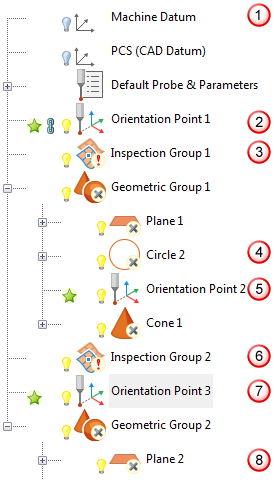You can place Orientation Point items anywhere in the Definition level of the Sequence Tree. You can also use them within a geometric group to orient the probe before or after any item.
The following example illustrates the use of Orientation Points:

 The inspection sequence starts by using the default (Machine Datum) to position and orient the probe.
The inspection sequence starts by using the default (Machine Datum) to position and orient the probe.
 The probe is transformed by Orientation Point 1.
The probe is transformed by Orientation Point 1.
 In Inspection Group 1, Auto-Orientation is selected for the group's UserDefined probing method, so the probe is transformed before probing begins.
In Inspection Group 1, Auto-Orientation is selected for the group's UserDefined probing method, so the probe is transformed before probing begins.
 In Circle 2, Auto-Orientation is not selected, so, before the first point on the Circle 2 probe path is played, the probe is transformed back to Orientation Point 1 because it is the preceding orientation point.
In Circle 2, Auto-Orientation is not selected, so, before the first point on the Circle 2 probe path is played, the probe is transformed back to Orientation Point 1 because it is the preceding orientation point.
 Orientation Point 2 transforms the probe for Cone 1.
Orientation Point 2 transforms the probe for Cone 1.
 Inspection Group 2 does not use Auto-Orientation, so the probe uses the orientation of Orientation Point 1 because it is the preceding orientation point item at that level in the inspection sequence.
Inspection Group 2 does not use Auto-Orientation, so the probe uses the orientation of Orientation Point 1 because it is the preceding orientation point item at that level in the inspection sequence.
 When the probing of Inspection group 2 is complete, the probe is transformed by Orientation Point 3.
When the probing of Inspection group 2 is complete, the probe is transformed by Orientation Point 3.
 If Geometric Group 2 contains any item in which Auto-Orientation is selected, the probe is transformed by the associated probing method. Otherwise, the probe remains at the rotation specified in Orientation Point 3.
If Geometric Group 2 contains any item in which Auto-Orientation is selected, the probe is transformed by the associated probing method. Otherwise, the probe remains at the rotation specified in Orientation Point 3.